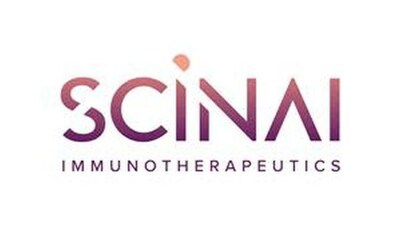Scinai Announces Promising Results in a Psoriatic Human Skin Model
- Successful preclinical trial results of the innovative anti–IL–17 VHH antibody ('NanoAb')
- Significantly reduced IL-17 release (p<0.001) compared to the untreated control, similar to the effects of Betamethasone and Cosentyx
- Improved skin structure following a single dose, more efficient than Betamethasone in reducing inflammation-induced skin, and at least as efficient as Cosentyx
- None.
Insights
Analyzing...

The study, conducted by Genoskin, a pioneering French biotechnology company, aimed to evaluate the anti-inflammatory effects of Scinai's NanoAbs. Genoskin's proprietary human skin models were induced for expression of plaque psoriasis symptoms to enable ex–vivo examination of the therapeutic effects of drugs targeting underlying mechanisms in the pathogenesis of plaque psoriasis, particularly the IL-17 family of pro-inflammatory cytokines. This disease-induced skin model reproduces key features of plaque psoriasis tissue morphology as well as the cytokine profile associated with the inflammatory state of plaque psoriasis lesions. Genoskin's model has been successfully validated[1] as a reliable ex-vivo system for testing drugs aimed at plaque psoriasis.
The trial's study groups included intradermal injections in two dosage schedules of Scinai's anti-IL-17 NanoAbs, which were compared to Cosentyx® (a leading monoclonal anti-IL-17A antibody treatment for severe psoriasis), Betamethasone (a topically applied corticosteroid used a treatment for mild to moderate psoriasis), an unrelated VHH NanoAb, and an untreated control. The anti-inflammatory effect of Scinai's NanoAbs were evaluated by measuring cytokine levels secreted by the skin tissues, including IL-17 family cytokines. Additionally, the skin's structure, integrity, and viability were assessed by a histological analysis.
The statistically significant results demonstrated the potential for Scinai's anti-IL-17 NanoAbs to noticeably improve psoriatic skin lesions as indicated by skin viability and structural integrity. This finding was corroborated by cytokine release analysis, which showed significantly reduced IL-17 release (p<0.001) as compared to the untreated control, similar to the effects of Betamethasone and Cosentyx. These results were further supported by histopathology results demonstrating improved skin structure following a single dose, which appeared more efficient than Betamethasone in reducing inflammation-induced skin and at least as efficient as Cosentyx.
The results confirm and build upon previously reported results indicating that Scinai's anti–IL–17 NanoAbs downregulated key molecular markers overexpressed in plaque psoriasis in a 3D scaffold of skin cells, a model mimicking a skin tissue.
Dr. Tamar Ben-Yedidia, Scinai's Chief Scientist, noted, "These positive results mark a significant step forward in the development of a novel treatment for the undertreated segment of mild and moderate plaque psoriatic patients. To date, most of the innovation related to treatment of autoimmune diseases focused on drugs aimed at the more severe cases of these diseases, leaving milder cases with generic topical drugs and phototherapy treatments. The mild psoriatic patients account for more than
"I'd like to thank the Genoskin team for their professional collaboration," continued Ben-Yedidia.
Scinai next intends to conduct an in-vivo proof of concept animal study in early 2024 in collaboration with the prestigious Technion Israel Institute of Technology complemented by a pre-clinical toxicology study before commencing a first-in-human clinical trial in late 2024. Scinai is excited about the potential of its compounds and looks forward to further advancements in this field.
About IL-17's role in Psoriasis:
IL-17 plays a major role in the development of plaque psoriasis and is the molecular target of several biological treatments, mainly monoclonal antibodies (mAbs), which mostly target pro-inflammatory cytokines or their receptors in the skin tissue. Cosentyx (Novartis) and Taltz (Lilly), are examples of mAbs that target the cytokine IL-17 in its IL-17A isoform and are provided to patients with moderate to severe psoriasis. Research shows that targeting the IL-17F isoform in addition to IL-17A provides higher efficacy in treating plaque psoriasis. The recently launched Bimzelx (UCB) was the first mAb targeting both IL-17A and F to be approved by the European Medicines Agency (EMA). MoonLake Immunotherapeutics is also developing a VHH antibody (nanobody) targeting both IL-17A and F. Last year, MoonLake reported superior results vs. Cosentyx in a phase 2 plaque psoriasis clinical trial. All the above-mentioned antibodies, indicated only for moderate to severe plaque psoriasis patients, are administered by subcutaneous injection for systemic drug distribution and carry the risk of considerable side effects. These drugs are also expensive and require chronic, injections, each at a cost of several thousand dollars. Mild psoriasis, which accounts for more than
Conversely, Scinai's NanoAbs are designed to be administered locally to the dermis and are engineered to degrade in a way that should prevent systemic side effects. Results of this recent study suggest the potential for a highly efficacious, specific, yet safer and more convenient treatment for the large and underserved population of mild to moderate plaque psoriasis patients.
About Scinai's NanoAbs:
Scinai's NanoAbs are alpaca–derived recombinant variable domain of heavy-chain-only antibodies and are also known as nanobodies or VHH antibodies. The Company's pipeline of NanoAbs is being discovered by and licensed out of the prestigious Max Planck Society and the University Medical Center Göttingen (UMG), both in
Scinai's NanoAb development pipeline includes anti-IL-17 NanoAbs for the treatment of autoimmune diseases such as psoriasis, psoriatic arthritis, and Hidradenitis Suppurativa (HS). In addition, Scinai holds a five-year research collaboration agreement with Max Planck and UMG to discover and characterize additional NanoAbs aimed at molecular targets such as IL-13, IL-4, IL-4Ra and TSLP for the treatment of asthma and atopic dermatitis and Ang-2 and VEGF for the treatment of age-related wet macular degeneration. Scinai holds an exclusive option for exclusive license for each of the NanoAbs discovered through this research collaboration. The pipeline approach affords Scinai considerable flexibility with respect to partnering and spinning out assets, opening enhanced potential to generate income through license fees, milestone payments and royalties, in return for participation in associated R&D costs.
Scinai has previously demonstrated the potential of its NanoAbs as therapeutically viable molecules in COVID-19 animal studies. These studies showed that the Company's inhaled COVID–19 NanoAb therapy resulted in significantly milder and shorter illness, virtually eliminated the virus from the lungs, and even protected against illness when administered prophylactically. The studies also demonstrated Scinai's ability to manufacture NanoAbs in-house and to successfully deliver NanoAbs via inhalation, a difficult yet desirable route-of-administration for antibody drugs.
About Scinai Immunotherapeutics
Scinai Immunotherapeutics Ltd. (Nasdaq: SCNI) is a biopharmaceutical company with two complementary business units, one focused on in-house development of inflammation and immunology (I&I) biological products beginning with an innovative, de-risked, pipeline of nanosized VHH antibodies (NanoAbs) targeting diseases with large unmet medical needs, and the other a boutique CDMO providing services to help biotech companies efficiently bring their products to market by leveraging Scinai's drug development and GMP and non-GMP manufacturing capabilities for pre-clinical and clinical studies. Company website: www.scinai.com.
Company Contact
Joshua Phillipson | +972 8 930 2529 | joshua.phillipson@scinai.com
Forward-Looking Statements
This press release contains forward-looking statements within the meaning of the Private Litigation Reform Act of 1995. Words such as "expect," "believe," "intend," "plan," "continue," "may," "will," "anticipate," and similar expressions are intended to identify forward-looking statements. All statements, other than statements of historical facts, included in this press release regarding strategy, future operations, future financial position, future revenue, projected expenses, prospects, plans and objectives of management are forward-looking statements. Examples of such statements include, but are not limited to, the therapeutic and commercial potential of nanosized antibodies (NanoAbs); and the timing of NanoAb proof-of-concept studies and clinical trials. These forward–looking statements reflect management's current views with respect to certain current and future events and are subject to various risks, uncertainties and assumptions that could cause the results to differ materially from those expected by the management of Scinai Immunotherapeutics Ltd. Risks and uncertainties include, but are not limited to, the risk of delay in the NanoAb proof-of-concept studies and clinical trial, the risk that the Company will not remain listed on Nasdaq, the risk that the Company will not be successful in becoming an end-to-end provider of CDMO services at high international standards, that Scinai may not be able to secure additional capital on attractive terms, if at all; the risk that the therapeutic and commercial potential of NanoAbs will not be met; the risk of a delay in the preclinical and clinical trials data for NanoAbs, if any; the risk that our business strategy may not be successful; the risk that the European Investment Bank (EIB) may accelerate the financial facility under its finance contract with Scinai; Scinai's ability to acquire rights to additional product opportunities; Scinai's ability to enter into collaborations on terms acceptable to Scinai or at all; timing of receipt of regulatory approval of Scinai's manufacturing facility in
[1] Jardet et al. Development and characterization of a human Th17-driven ex vivo skin inflammation model. Experimental Dermatology. https://doi.org/10.1111/exd.14160
[2] Papp et al. https://doi.org/10.1007/s13555-021-00518-8. Dermatology and Therapy. https://doi.org/10.1007/s13555-021-00518-8
Logo: https://mma.prnewswire.com/media/2281627/4414902/Scinai_Logo
![]() View original content:https://www.prnewswire.com/news-releases/scinai-announces-promising-results-in-a-psoriatic-human-skin-model-302012584.html
View original content:https://www.prnewswire.com/news-releases/scinai-announces-promising-results-in-a-psoriatic-human-skin-model-302012584.html
SOURCE Scinai Immunotherapeutics Ltd.







